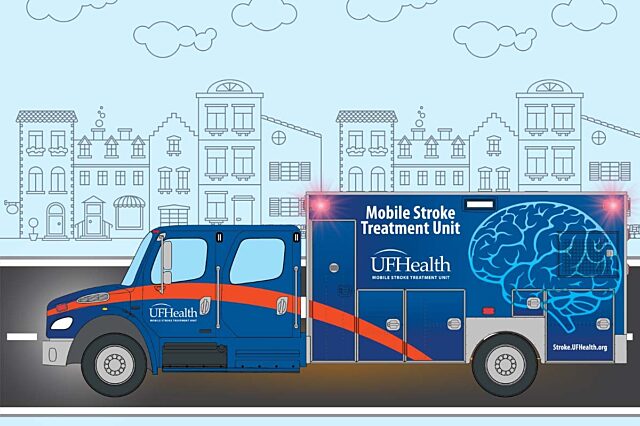The UF Health Shands Comprehensive Stroke Center is certified by the Joint Commission and the American Stroke Association/American Heart Association and is dedicated to providing life-saving stroke care. Every second counts.

Update your location to show providers, locations, and services closest to you.
Neurovascular surgery is a branch of medicine that deals with the diagnosis, treatment, and prevention of diseases that affect the brain and spinal cord, including their blood vessels. These procedures are performed to address a wide range of conditions, including stroke, brain aneurysms, arteriovenous malformations, or AVMs and brain tumors.
The neurovascular program at UF Health Shands Hospital is one of the leading programs in the nation for comprehensive cerebrovascular and endovascular neurosurgery. The team performs nearly 1,000 procedures annually. This includes endovascular and open cerebrovascular surgery to treat many of the most complex neurovascular diseases. The UF Health neurovascular team performs many of the latest endovascular neurosurgical procedures using image-guidance technology for both diagnosis and treatment.
Endovascular neurosurgery is a minimally invasive form of neurovascular surgery. It uses a catheter-based approach to diagnose and treat conditions of the brain and spinal cord. This technique allows the surgeon to access the patient's vascular system through a small incision in the groin area. This reduces the need for open surgery and minimizes recovery time. Endovascular neurosurgery is often used to treat aneurysms, AVMs and certain types of stroke. The term endovascular means “inside a blood vessel.”
795,000 people in the United States each year with an ischemic stroke. Of those about one-third, or nearly 235,000, have a large vessel occlusion. This means they could be candidates for endovascular surgery after stroke. This can have an overwhelmingly positive effect on outcomes.
Recent studies show that people who had endovascular surgery to treat stroke were more likely to return to normal life than people who received medical treatment only.
Doctors that specialize in endovascular neurosurgery use tools that pass through blood vessels to diagnose and treat diseases and conditions rather than using open surgery. These tools include radiology images that allow the doctor to see the part of the body involved in the procedure. Doctors in this specialty may also diagnose and treat spinal cord conditions using similar techniques.
Cerebrovascular neurosurgery is a form of neurovascular surgery. It specifically focuses on the blood vessels of the brain and conditions associated with those vessels. This type of surgery is performed to treat conditions such as:
By using advanced techniques and technologies, cerebrovascular neurosurgeons are able to restore normal blood flow to the brain and prevent life-threatening conditions.
The UF neurovascular surgeons performs almost 1,000 procedures every year. These include:
The UF Health neurovascular surgery team are a vital part of the UF Health Shands Comprehensive Stroke Center.
The UF Health Shands Comprehensive Stroke Center is certified by the Joint Commission and the American Stroke Association/American Heart Association and is dedicated to providing life-saving stroke care. Every second counts.

The team actively participates in many cerebrovascular/endovascular clinical trials where the latest high-technology devices are constantly being evaluated and perfected for improved patient care. An active research laboratory focuses on prevention and treatment of stroke, intracranial aneurysms and arteriovenous malformations.
UF is an active participation site for many cerebrovascular and endovascular clinical trials. The latest technological advances are constantly being evaluated and perfected for enhanced patient care.
UF is the clinical coordinating center for the CAPTIVA trial, a national clinical trial evaluating stroke prevention approaches and supported by a $38 million NIH award.

With numerous grants from the NIH, Brain Aneurysm Foundation, American Association of Neurologic Surgeons Neurosurgery Research and Education Foundation, Thomas Maren Foundation, and others, Dr. Hoh’s laboratory performs research investigating:
The identification of cytokines and other factors responsible for aneurysm formation and rupture using human cerebral aneurysm tissue.
The neurovascular surgery team also operates the neurovascular-neurotrauma lab. The team has developed a clinical platform to investigate proteomics and their potential use in acute brain injury. In addition, the lab is involved in NIH-funded work in collaboration with other academic medical centers.
Numerous studies are also underway in the area of cerebrovascular surgery. Among them is research into proteomics and biomarkers in acute brain injury from aneurysmal subarachnoid hemorrhage to determine if specific biomarkers can be used to define specific events occurring in the injured brain.
If you or a loved one is suffering from a neurovascular condition, we encourage you to reach out to us for a consultation. We are here to help and provide you with the information and support you need to make informed decisions about your care.




February 16, 2023
To improve stroke outcomes for Floridians, UF Health is launching a statewide network of mobile stroke treatment units — specialized ambulances equipped to…
Department of Neurosurgery, +4 more
